Earnings Management: An Analysis of Auditor's Role and Procedures
VerifiedAdded on 2022/10/31
|16
|4525
|226
Report
AI Summary
This report delves into the complexities of earnings management, examining its impact on auditors and auditing activities. It begins with a definition of earnings management and explores the motivations behind it, particularly from the perspective of company managers. The report then investigates the auditor's role in detecting and preventing earnings management, highlighting both the positive and negative aspects of auditor involvement. A key focus is the effect of earnings management on substantive audit procedures, with a detailed discussion of how these procedures can be compromised. Furthermore, the report presents a case study of an Australian company, HIH insurance, illustrating real-world examples of earnings management and its consequences. Finally, the report concludes with recommendations for mitigating the negative impacts of earnings management and improving the integrity of financial reporting. This is a comprehensive analysis of earnings management, its implications, and the role of auditors in ensuring financial accuracy.
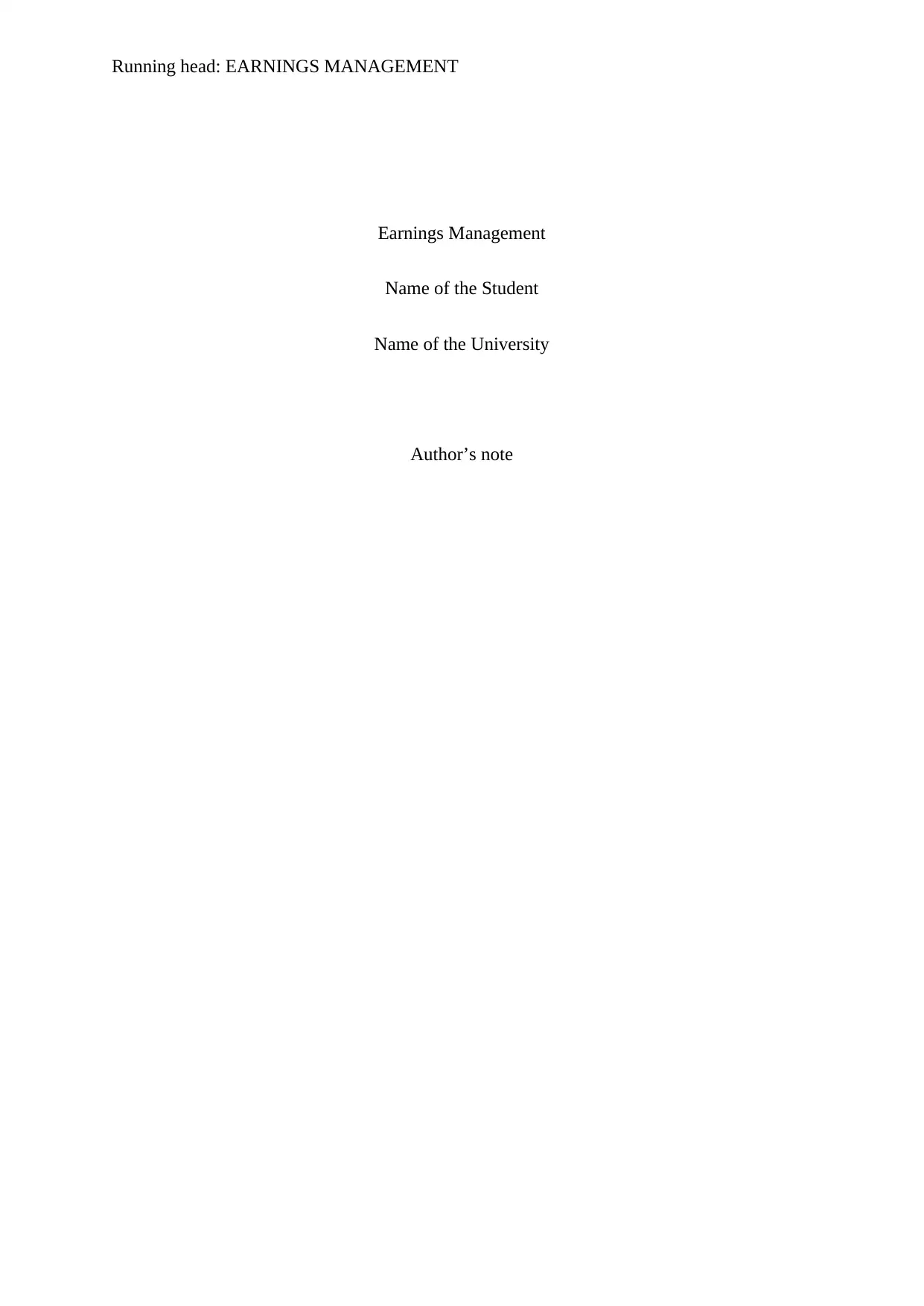
Running head: EARNINGS MANAGEMENT
Earnings Management
Name of the Student
Name of the University
Author’s note
Earnings Management
Name of the Student
Name of the University
Author’s note
Paraphrase This Document
Need a fresh take? Get an instant paraphrase of this document with our AI Paraphraser
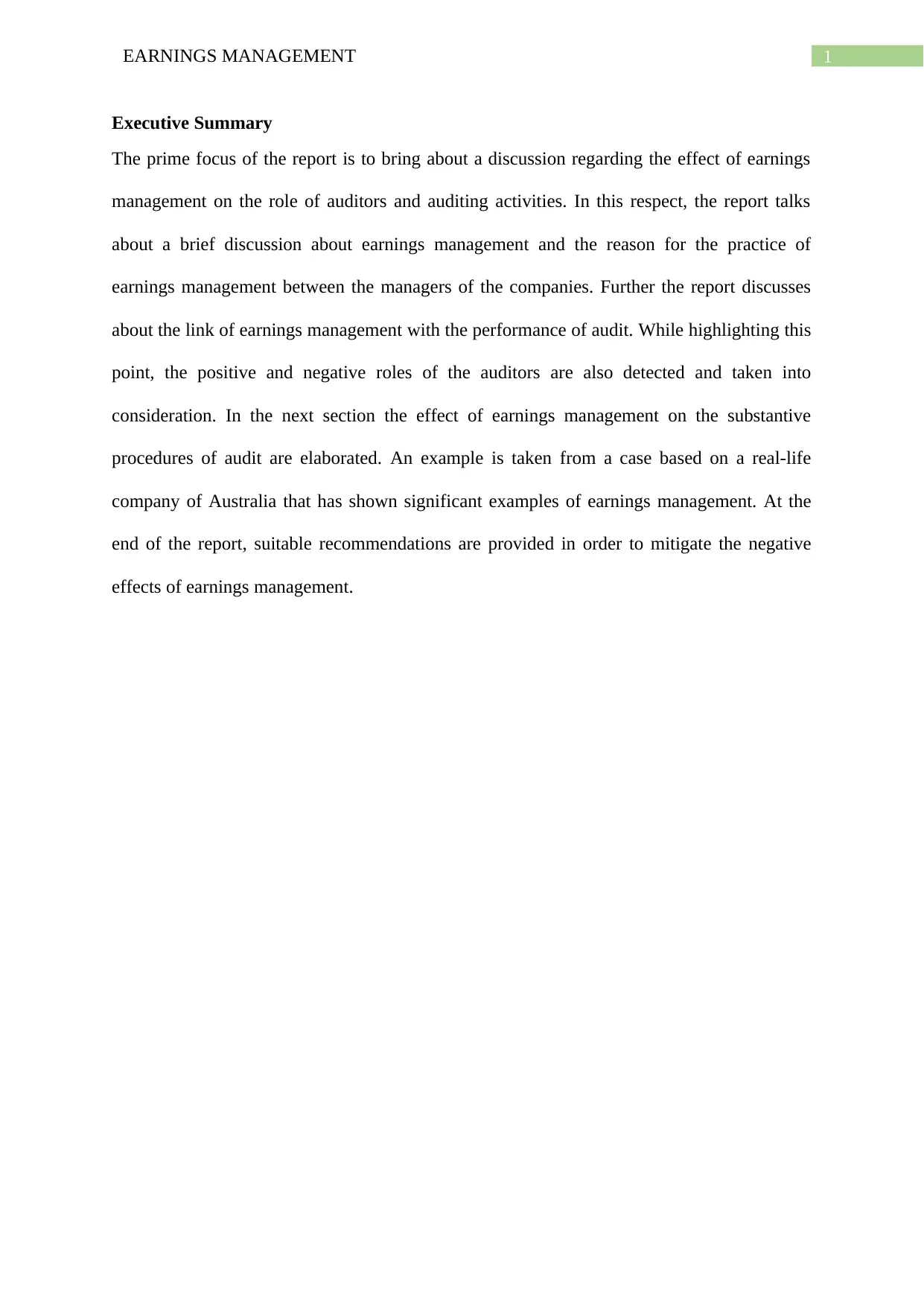
1EARNINGS MANAGEMENT
Executive Summary
The prime focus of the report is to bring about a discussion regarding the effect of earnings
management on the role of auditors and auditing activities. In this respect, the report talks
about a brief discussion about earnings management and the reason for the practice of
earnings management between the managers of the companies. Further the report discusses
about the link of earnings management with the performance of audit. While highlighting this
point, the positive and negative roles of the auditors are also detected and taken into
consideration. In the next section the effect of earnings management on the substantive
procedures of audit are elaborated. An example is taken from a case based on a real-life
company of Australia that has shown significant examples of earnings management. At the
end of the report, suitable recommendations are provided in order to mitigate the negative
effects of earnings management.
Executive Summary
The prime focus of the report is to bring about a discussion regarding the effect of earnings
management on the role of auditors and auditing activities. In this respect, the report talks
about a brief discussion about earnings management and the reason for the practice of
earnings management between the managers of the companies. Further the report discusses
about the link of earnings management with the performance of audit. While highlighting this
point, the positive and negative roles of the auditors are also detected and taken into
consideration. In the next section the effect of earnings management on the substantive
procedures of audit are elaborated. An example is taken from a case based on a real-life
company of Australia that has shown significant examples of earnings management. At the
end of the report, suitable recommendations are provided in order to mitigate the negative
effects of earnings management.
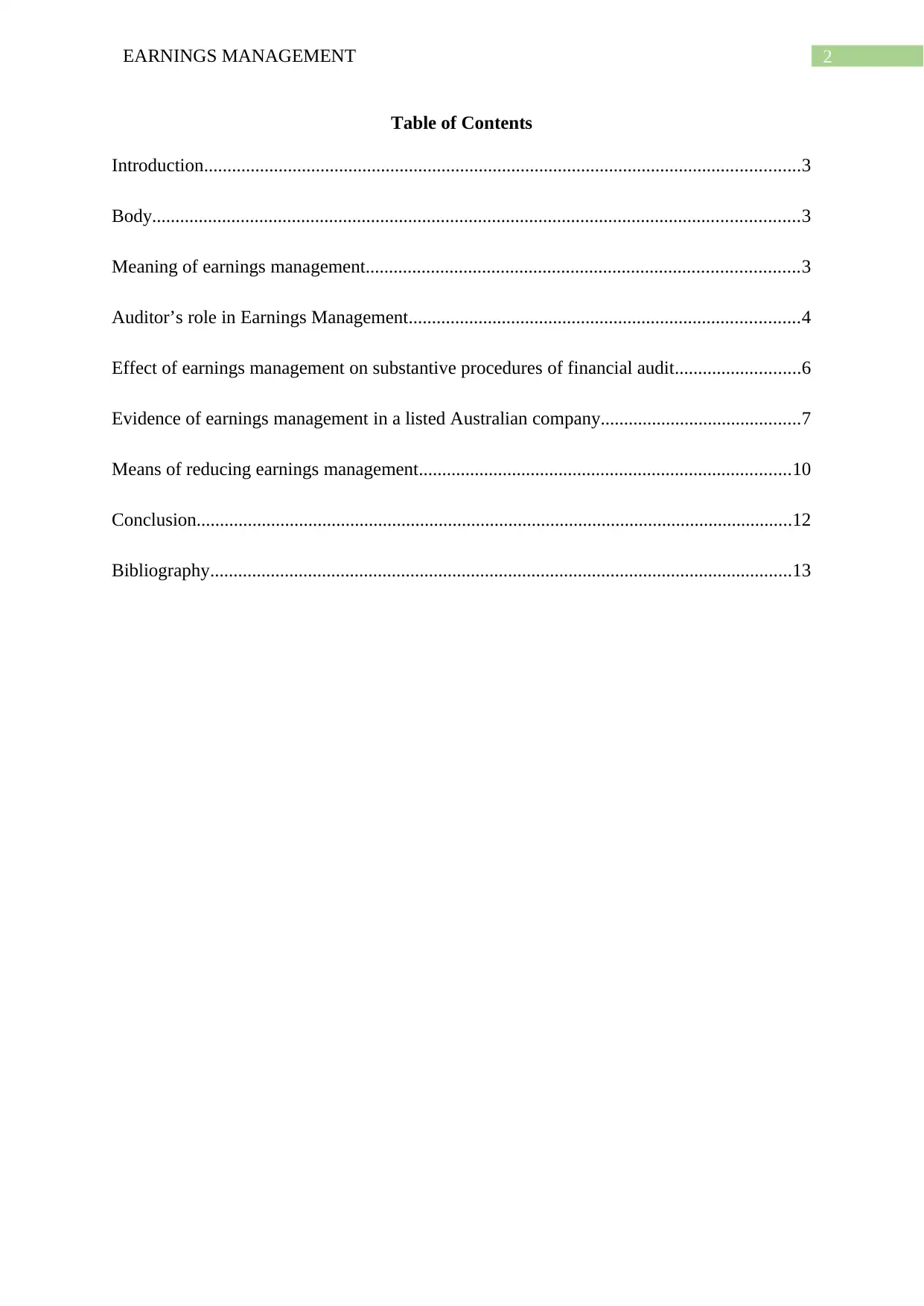
2EARNINGS MANAGEMENT
Table of Contents
Introduction................................................................................................................................3
Body...........................................................................................................................................3
Meaning of earnings management.............................................................................................3
Auditor’s role in Earnings Management....................................................................................4
Effect of earnings management on substantive procedures of financial audit...........................6
Evidence of earnings management in a listed Australian company...........................................7
Means of reducing earnings management................................................................................10
Conclusion................................................................................................................................12
Bibliography.............................................................................................................................13
Table of Contents
Introduction................................................................................................................................3
Body...........................................................................................................................................3
Meaning of earnings management.............................................................................................3
Auditor’s role in Earnings Management....................................................................................4
Effect of earnings management on substantive procedures of financial audit...........................6
Evidence of earnings management in a listed Australian company...........................................7
Means of reducing earnings management................................................................................10
Conclusion................................................................................................................................12
Bibliography.............................................................................................................................13
⊘ This is a preview!⊘
Do you want full access?
Subscribe today to unlock all pages.

Trusted by 1+ million students worldwide
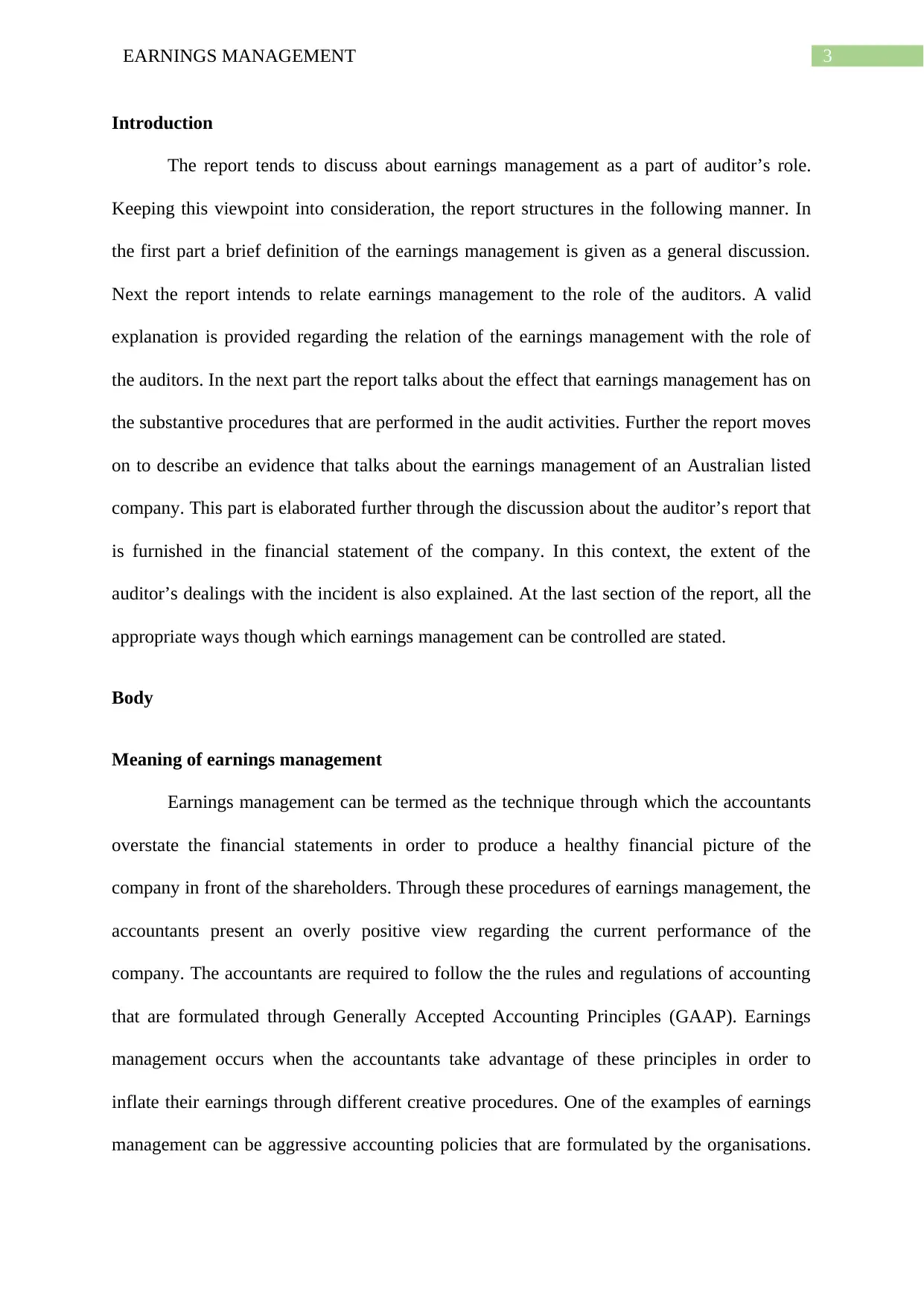
3EARNINGS MANAGEMENT
Introduction
The report tends to discuss about earnings management as a part of auditor’s role.
Keeping this viewpoint into consideration, the report structures in the following manner. In
the first part a brief definition of the earnings management is given as a general discussion.
Next the report intends to relate earnings management to the role of the auditors. A valid
explanation is provided regarding the relation of the earnings management with the role of
the auditors. In the next part the report talks about the effect that earnings management has on
the substantive procedures that are performed in the audit activities. Further the report moves
on to describe an evidence that talks about the earnings management of an Australian listed
company. This part is elaborated further through the discussion about the auditor’s report that
is furnished in the financial statement of the company. In this context, the extent of the
auditor’s dealings with the incident is also explained. At the last section of the report, all the
appropriate ways though which earnings management can be controlled are stated.
Body
Meaning of earnings management
Earnings management can be termed as the technique through which the accountants
overstate the financial statements in order to produce a healthy financial picture of the
company in front of the shareholders. Through these procedures of earnings management, the
accountants present an overly positive view regarding the current performance of the
company. The accountants are required to follow the the rules and regulations of accounting
that are formulated through Generally Accepted Accounting Principles (GAAP). Earnings
management occurs when the accountants take advantage of these principles in order to
inflate their earnings through different creative procedures. One of the examples of earnings
management can be aggressive accounting policies that are formulated by the organisations.
Introduction
The report tends to discuss about earnings management as a part of auditor’s role.
Keeping this viewpoint into consideration, the report structures in the following manner. In
the first part a brief definition of the earnings management is given as a general discussion.
Next the report intends to relate earnings management to the role of the auditors. A valid
explanation is provided regarding the relation of the earnings management with the role of
the auditors. In the next part the report talks about the effect that earnings management has on
the substantive procedures that are performed in the audit activities. Further the report moves
on to describe an evidence that talks about the earnings management of an Australian listed
company. This part is elaborated further through the discussion about the auditor’s report that
is furnished in the financial statement of the company. In this context, the extent of the
auditor’s dealings with the incident is also explained. At the last section of the report, all the
appropriate ways though which earnings management can be controlled are stated.
Body
Meaning of earnings management
Earnings management can be termed as the technique through which the accountants
overstate the financial statements in order to produce a healthy financial picture of the
company in front of the shareholders. Through these procedures of earnings management, the
accountants present an overly positive view regarding the current performance of the
company. The accountants are required to follow the the rules and regulations of accounting
that are formulated through Generally Accepted Accounting Principles (GAAP). Earnings
management occurs when the accountants take advantage of these principles in order to
inflate their earnings through different creative procedures. One of the examples of earnings
management can be aggressive accounting policies that are formulated by the organisations.
Paraphrase This Document
Need a fresh take? Get an instant paraphrase of this document with our AI Paraphraser
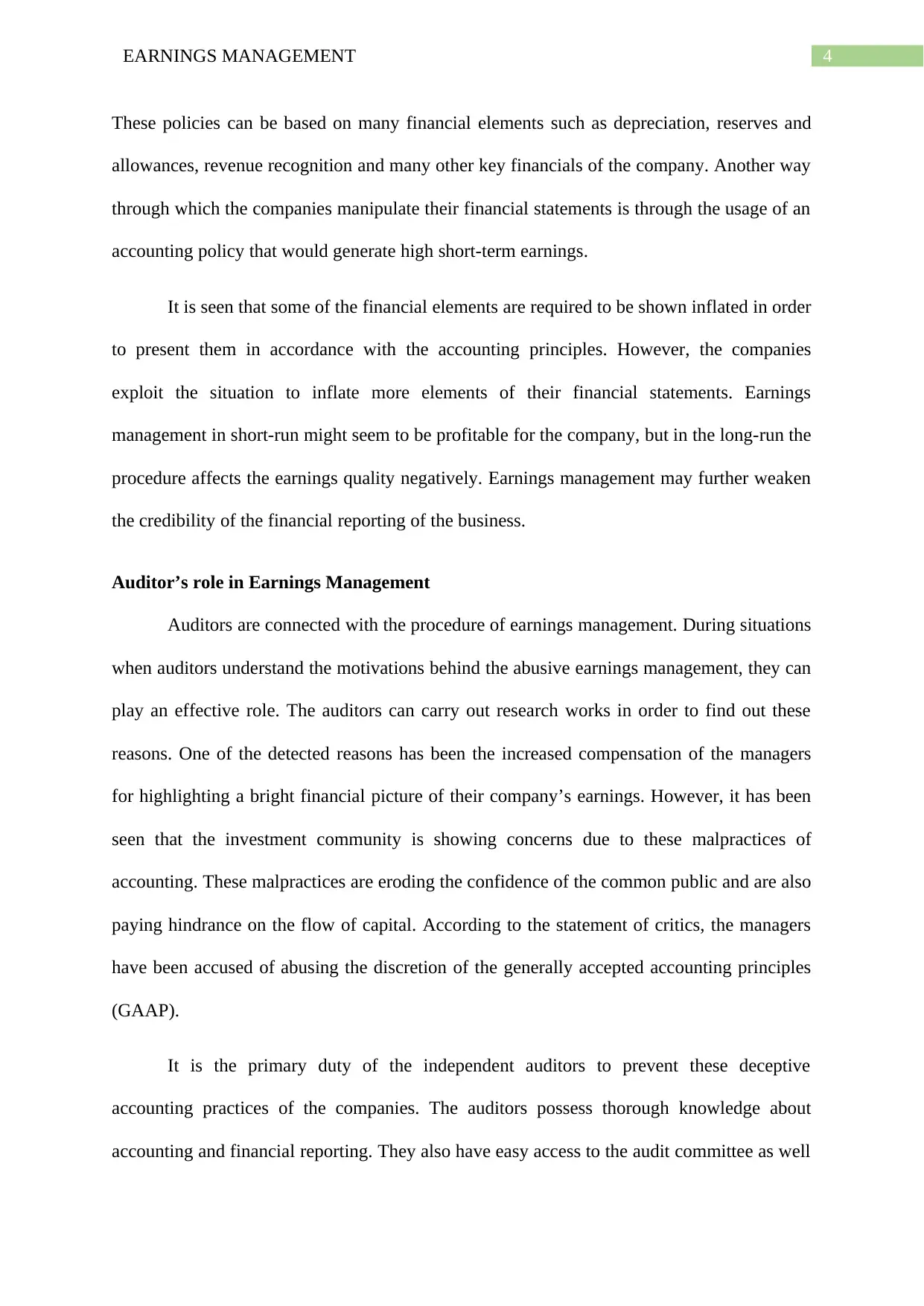
4EARNINGS MANAGEMENT
These policies can be based on many financial elements such as depreciation, reserves and
allowances, revenue recognition and many other key financials of the company. Another way
through which the companies manipulate their financial statements is through the usage of an
accounting policy that would generate high short-term earnings.
It is seen that some of the financial elements are required to be shown inflated in order
to present them in accordance with the accounting principles. However, the companies
exploit the situation to inflate more elements of their financial statements. Earnings
management in short-run might seem to be profitable for the company, but in the long-run the
procedure affects the earnings quality negatively. Earnings management may further weaken
the credibility of the financial reporting of the business.
Auditor’s role in Earnings Management
Auditors are connected with the procedure of earnings management. During situations
when auditors understand the motivations behind the abusive earnings management, they can
play an effective role. The auditors can carry out research works in order to find out these
reasons. One of the detected reasons has been the increased compensation of the managers
for highlighting a bright financial picture of their company’s earnings. However, it has been
seen that the investment community is showing concerns due to these malpractices of
accounting. These malpractices are eroding the confidence of the common public and are also
paying hindrance on the flow of capital. According to the statement of critics, the managers
have been accused of abusing the discretion of the generally accepted accounting principles
(GAAP).
It is the primary duty of the independent auditors to prevent these deceptive
accounting practices of the companies. The auditors possess thorough knowledge about
accounting and financial reporting. They also have easy access to the audit committee as well
These policies can be based on many financial elements such as depreciation, reserves and
allowances, revenue recognition and many other key financials of the company. Another way
through which the companies manipulate their financial statements is through the usage of an
accounting policy that would generate high short-term earnings.
It is seen that some of the financial elements are required to be shown inflated in order
to present them in accordance with the accounting principles. However, the companies
exploit the situation to inflate more elements of their financial statements. Earnings
management in short-run might seem to be profitable for the company, but in the long-run the
procedure affects the earnings quality negatively. Earnings management may further weaken
the credibility of the financial reporting of the business.
Auditor’s role in Earnings Management
Auditors are connected with the procedure of earnings management. During situations
when auditors understand the motivations behind the abusive earnings management, they can
play an effective role. The auditors can carry out research works in order to find out these
reasons. One of the detected reasons has been the increased compensation of the managers
for highlighting a bright financial picture of their company’s earnings. However, it has been
seen that the investment community is showing concerns due to these malpractices of
accounting. These malpractices are eroding the confidence of the common public and are also
paying hindrance on the flow of capital. According to the statement of critics, the managers
have been accused of abusing the discretion of the generally accepted accounting principles
(GAAP).
It is the primary duty of the independent auditors to prevent these deceptive
accounting practices of the companies. The auditors possess thorough knowledge about
accounting and financial reporting. They also have easy access to the audit committee as well
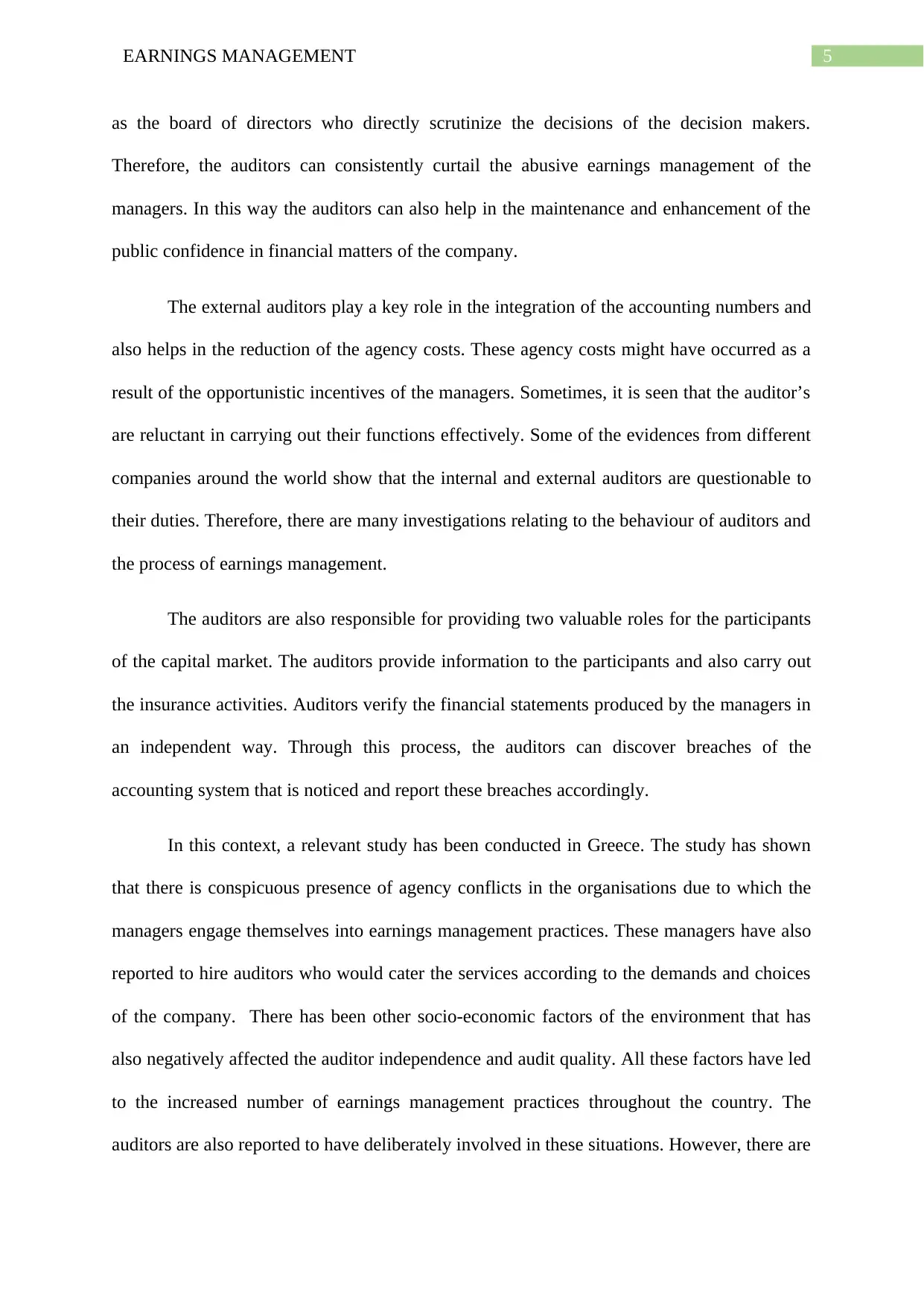
5EARNINGS MANAGEMENT
as the board of directors who directly scrutinize the decisions of the decision makers.
Therefore, the auditors can consistently curtail the abusive earnings management of the
managers. In this way the auditors can also help in the maintenance and enhancement of the
public confidence in financial matters of the company.
The external auditors play a key role in the integration of the accounting numbers and
also helps in the reduction of the agency costs. These agency costs might have occurred as a
result of the opportunistic incentives of the managers. Sometimes, it is seen that the auditor’s
are reluctant in carrying out their functions effectively. Some of the evidences from different
companies around the world show that the internal and external auditors are questionable to
their duties. Therefore, there are many investigations relating to the behaviour of auditors and
the process of earnings management.
The auditors are also responsible for providing two valuable roles for the participants
of the capital market. The auditors provide information to the participants and also carry out
the insurance activities. Auditors verify the financial statements produced by the managers in
an independent way. Through this process, the auditors can discover breaches of the
accounting system that is noticed and report these breaches accordingly.
In this context, a relevant study has been conducted in Greece. The study has shown
that there is conspicuous presence of agency conflicts in the organisations due to which the
managers engage themselves into earnings management practices. These managers have also
reported to hire auditors who would cater the services according to the demands and choices
of the company. There has been other socio-economic factors of the environment that has
also negatively affected the auditor independence and audit quality. All these factors have led
to the increased number of earnings management practices throughout the country. The
auditors are also reported to have deliberately involved in these situations. However, there are
as the board of directors who directly scrutinize the decisions of the decision makers.
Therefore, the auditors can consistently curtail the abusive earnings management of the
managers. In this way the auditors can also help in the maintenance and enhancement of the
public confidence in financial matters of the company.
The external auditors play a key role in the integration of the accounting numbers and
also helps in the reduction of the agency costs. These agency costs might have occurred as a
result of the opportunistic incentives of the managers. Sometimes, it is seen that the auditor’s
are reluctant in carrying out their functions effectively. Some of the evidences from different
companies around the world show that the internal and external auditors are questionable to
their duties. Therefore, there are many investigations relating to the behaviour of auditors and
the process of earnings management.
The auditors are also responsible for providing two valuable roles for the participants
of the capital market. The auditors provide information to the participants and also carry out
the insurance activities. Auditors verify the financial statements produced by the managers in
an independent way. Through this process, the auditors can discover breaches of the
accounting system that is noticed and report these breaches accordingly.
In this context, a relevant study has been conducted in Greece. The study has shown
that there is conspicuous presence of agency conflicts in the organisations due to which the
managers engage themselves into earnings management practices. These managers have also
reported to hire auditors who would cater the services according to the demands and choices
of the company. There has been other socio-economic factors of the environment that has
also negatively affected the auditor independence and audit quality. All these factors have led
to the increased number of earnings management practices throughout the country. The
auditors are also reported to have deliberately involved in these situations. However, there are
⊘ This is a preview!⊘
Do you want full access?
Subscribe today to unlock all pages.

Trusted by 1+ million students worldwide
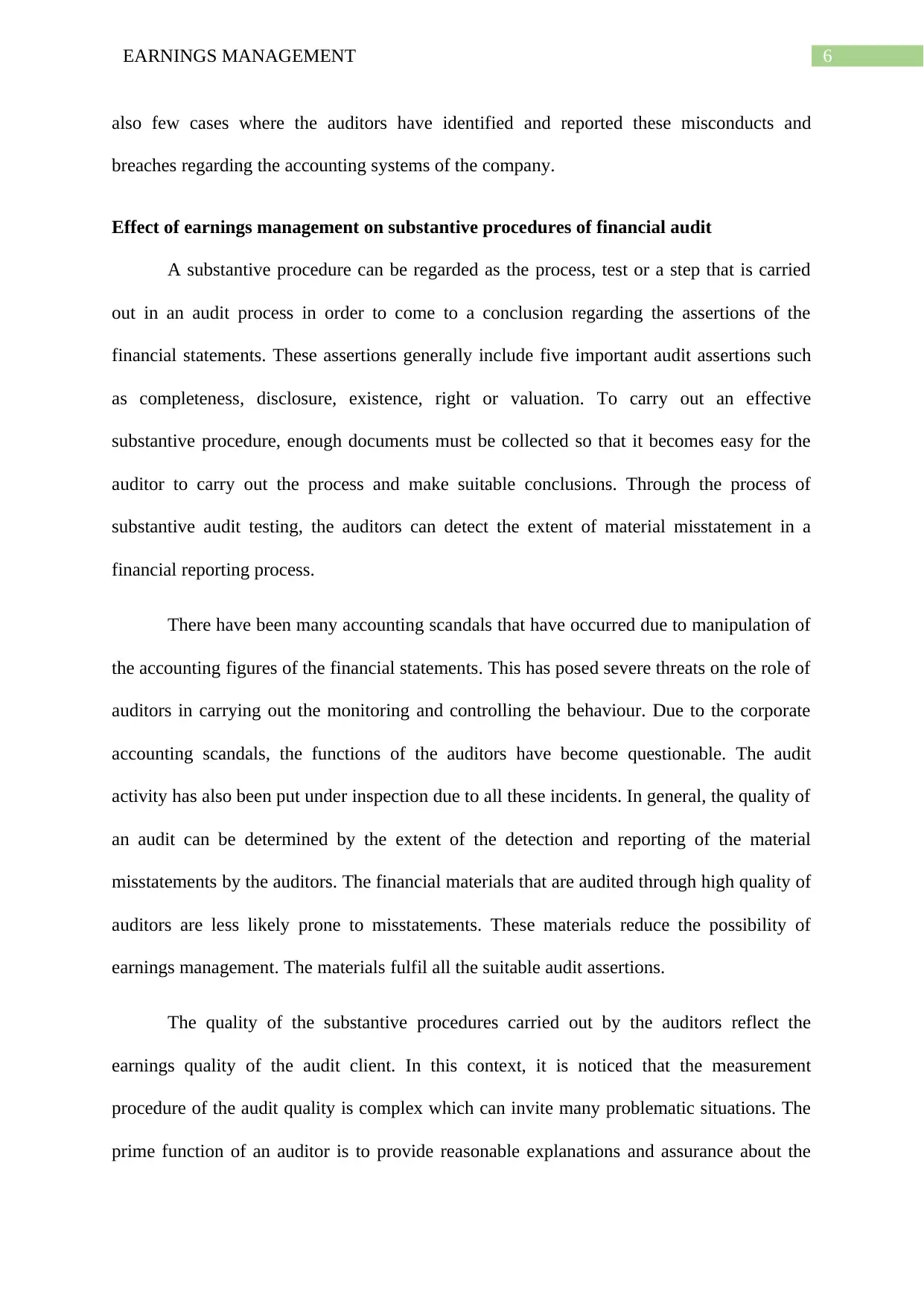
6EARNINGS MANAGEMENT
also few cases where the auditors have identified and reported these misconducts and
breaches regarding the accounting systems of the company.
Effect of earnings management on substantive procedures of financial audit
A substantive procedure can be regarded as the process, test or a step that is carried
out in an audit process in order to come to a conclusion regarding the assertions of the
financial statements. These assertions generally include five important audit assertions such
as completeness, disclosure, existence, right or valuation. To carry out an effective
substantive procedure, enough documents must be collected so that it becomes easy for the
auditor to carry out the process and make suitable conclusions. Through the process of
substantive audit testing, the auditors can detect the extent of material misstatement in a
financial reporting process.
There have been many accounting scandals that have occurred due to manipulation of
the accounting figures of the financial statements. This has posed severe threats on the role of
auditors in carrying out the monitoring and controlling the behaviour. Due to the corporate
accounting scandals, the functions of the auditors have become questionable. The audit
activity has also been put under inspection due to all these incidents. In general, the quality of
an audit can be determined by the extent of the detection and reporting of the material
misstatements by the auditors. The financial materials that are audited through high quality of
auditors are less likely prone to misstatements. These materials reduce the possibility of
earnings management. The materials fulfil all the suitable audit assertions.
The quality of the substantive procedures carried out by the auditors reflect the
earnings quality of the audit client. In this context, it is noticed that the measurement
procedure of the audit quality is complex which can invite many problematic situations. The
prime function of an auditor is to provide reasonable explanations and assurance about the
also few cases where the auditors have identified and reported these misconducts and
breaches regarding the accounting systems of the company.
Effect of earnings management on substantive procedures of financial audit
A substantive procedure can be regarded as the process, test or a step that is carried
out in an audit process in order to come to a conclusion regarding the assertions of the
financial statements. These assertions generally include five important audit assertions such
as completeness, disclosure, existence, right or valuation. To carry out an effective
substantive procedure, enough documents must be collected so that it becomes easy for the
auditor to carry out the process and make suitable conclusions. Through the process of
substantive audit testing, the auditors can detect the extent of material misstatement in a
financial reporting process.
There have been many accounting scandals that have occurred due to manipulation of
the accounting figures of the financial statements. This has posed severe threats on the role of
auditors in carrying out the monitoring and controlling the behaviour. Due to the corporate
accounting scandals, the functions of the auditors have become questionable. The audit
activity has also been put under inspection due to all these incidents. In general, the quality of
an audit can be determined by the extent of the detection and reporting of the material
misstatements by the auditors. The financial materials that are audited through high quality of
auditors are less likely prone to misstatements. These materials reduce the possibility of
earnings management. The materials fulfil all the suitable audit assertions.
The quality of the substantive procedures carried out by the auditors reflect the
earnings quality of the audit client. In this context, it is noticed that the measurement
procedure of the audit quality is complex which can invite many problematic situations. The
prime function of an auditor is to provide reasonable explanations and assurance about the
Paraphrase This Document
Need a fresh take? Get an instant paraphrase of this document with our AI Paraphraser
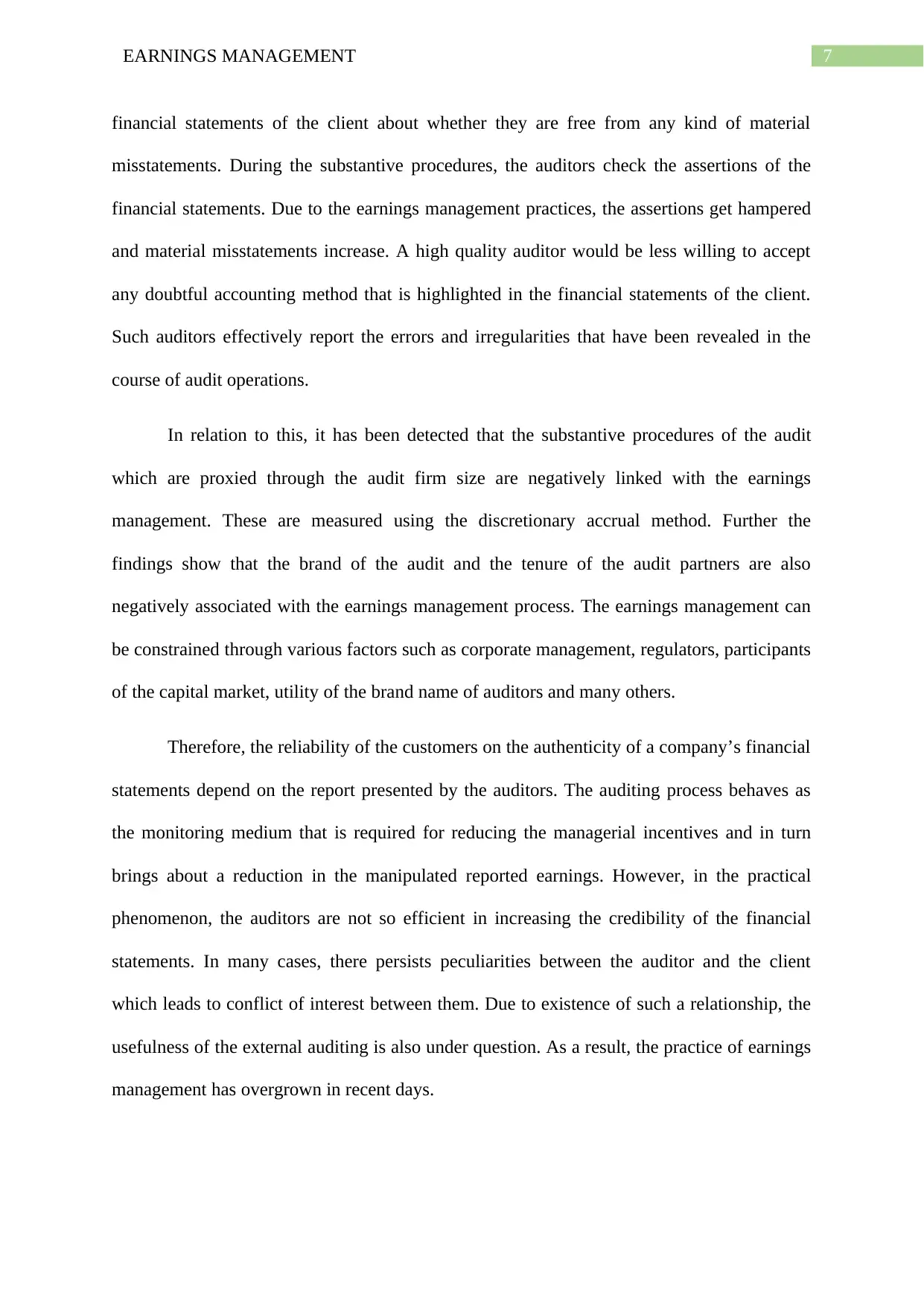
7EARNINGS MANAGEMENT
financial statements of the client about whether they are free from any kind of material
misstatements. During the substantive procedures, the auditors check the assertions of the
financial statements. Due to the earnings management practices, the assertions get hampered
and material misstatements increase. A high quality auditor would be less willing to accept
any doubtful accounting method that is highlighted in the financial statements of the client.
Such auditors effectively report the errors and irregularities that have been revealed in the
course of audit operations.
In relation to this, it has been detected that the substantive procedures of the audit
which are proxied through the audit firm size are negatively linked with the earnings
management. These are measured using the discretionary accrual method. Further the
findings show that the brand of the audit and the tenure of the audit partners are also
negatively associated with the earnings management process. The earnings management can
be constrained through various factors such as corporate management, regulators, participants
of the capital market, utility of the brand name of auditors and many others.
Therefore, the reliability of the customers on the authenticity of a company’s financial
statements depend on the report presented by the auditors. The auditing process behaves as
the monitoring medium that is required for reducing the managerial incentives and in turn
brings about a reduction in the manipulated reported earnings. However, in the practical
phenomenon, the auditors are not so efficient in increasing the credibility of the financial
statements. In many cases, there persists peculiarities between the auditor and the client
which leads to conflict of interest between them. Due to existence of such a relationship, the
usefulness of the external auditing is also under question. As a result, the practice of earnings
management has overgrown in recent days.
financial statements of the client about whether they are free from any kind of material
misstatements. During the substantive procedures, the auditors check the assertions of the
financial statements. Due to the earnings management practices, the assertions get hampered
and material misstatements increase. A high quality auditor would be less willing to accept
any doubtful accounting method that is highlighted in the financial statements of the client.
Such auditors effectively report the errors and irregularities that have been revealed in the
course of audit operations.
In relation to this, it has been detected that the substantive procedures of the audit
which are proxied through the audit firm size are negatively linked with the earnings
management. These are measured using the discretionary accrual method. Further the
findings show that the brand of the audit and the tenure of the audit partners are also
negatively associated with the earnings management process. The earnings management can
be constrained through various factors such as corporate management, regulators, participants
of the capital market, utility of the brand name of auditors and many others.
Therefore, the reliability of the customers on the authenticity of a company’s financial
statements depend on the report presented by the auditors. The auditing process behaves as
the monitoring medium that is required for reducing the managerial incentives and in turn
brings about a reduction in the manipulated reported earnings. However, in the practical
phenomenon, the auditors are not so efficient in increasing the credibility of the financial
statements. In many cases, there persists peculiarities between the auditor and the client
which leads to conflict of interest between them. Due to existence of such a relationship, the
usefulness of the external auditing is also under question. As a result, the practice of earnings
management has overgrown in recent days.
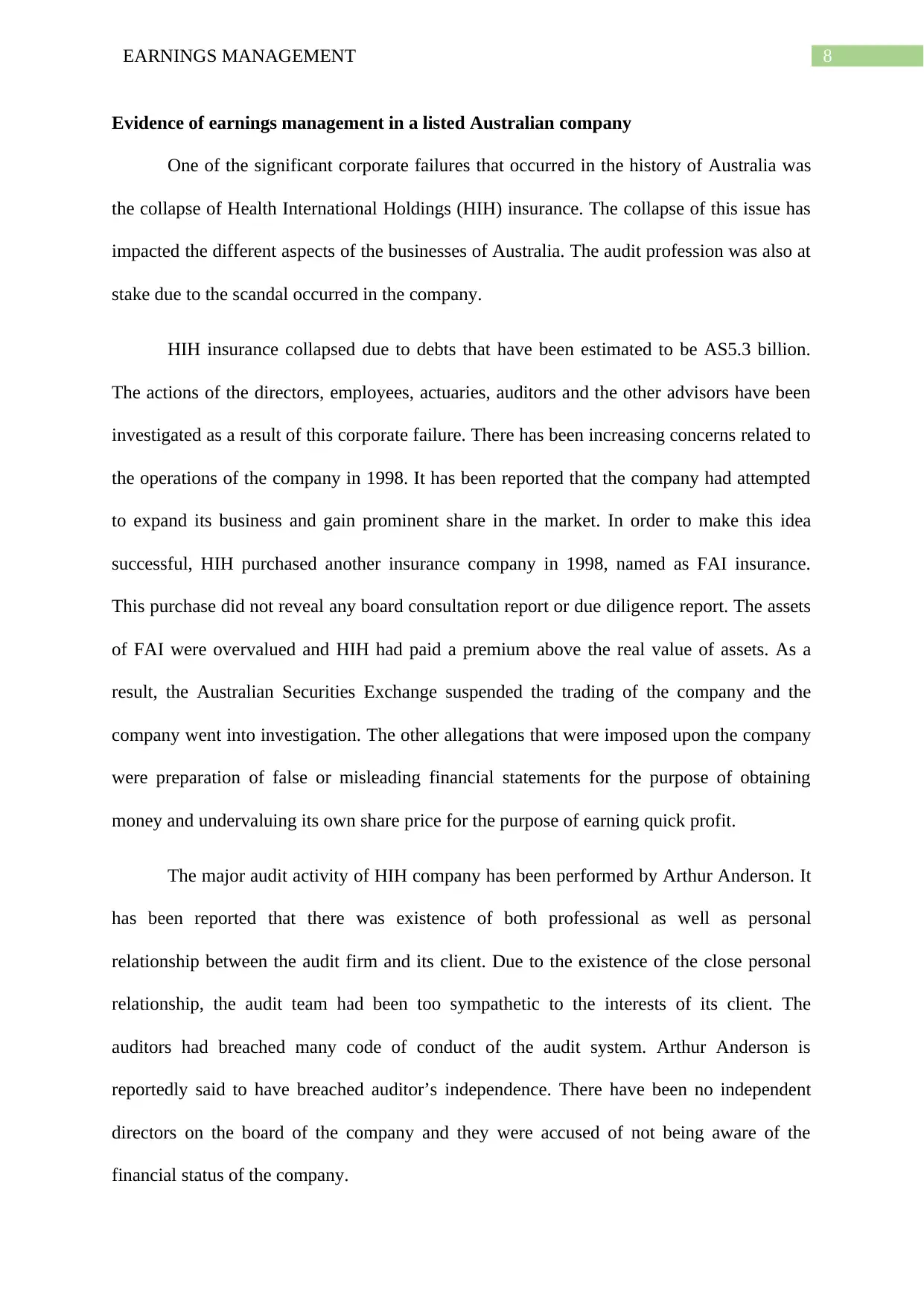
8EARNINGS MANAGEMENT
Evidence of earnings management in a listed Australian company
One of the significant corporate failures that occurred in the history of Australia was
the collapse of Health International Holdings (HIH) insurance. The collapse of this issue has
impacted the different aspects of the businesses of Australia. The audit profession was also at
stake due to the scandal occurred in the company.
HIH insurance collapsed due to debts that have been estimated to be AS5.3 billion.
The actions of the directors, employees, actuaries, auditors and the other advisors have been
investigated as a result of this corporate failure. There has been increasing concerns related to
the operations of the company in 1998. It has been reported that the company had attempted
to expand its business and gain prominent share in the market. In order to make this idea
successful, HIH purchased another insurance company in 1998, named as FAI insurance.
This purchase did not reveal any board consultation report or due diligence report. The assets
of FAI were overvalued and HIH had paid a premium above the real value of assets. As a
result, the Australian Securities Exchange suspended the trading of the company and the
company went into investigation. The other allegations that were imposed upon the company
were preparation of false or misleading financial statements for the purpose of obtaining
money and undervaluing its own share price for the purpose of earning quick profit.
The major audit activity of HIH company has been performed by Arthur Anderson. It
has been reported that there was existence of both professional as well as personal
relationship between the audit firm and its client. Due to the existence of the close personal
relationship, the audit team had been too sympathetic to the interests of its client. The
auditors had breached many code of conduct of the audit system. Arthur Anderson is
reportedly said to have breached auditor’s independence. There have been no independent
directors on the board of the company and they were accused of not being aware of the
financial status of the company.
Evidence of earnings management in a listed Australian company
One of the significant corporate failures that occurred in the history of Australia was
the collapse of Health International Holdings (HIH) insurance. The collapse of this issue has
impacted the different aspects of the businesses of Australia. The audit profession was also at
stake due to the scandal occurred in the company.
HIH insurance collapsed due to debts that have been estimated to be AS5.3 billion.
The actions of the directors, employees, actuaries, auditors and the other advisors have been
investigated as a result of this corporate failure. There has been increasing concerns related to
the operations of the company in 1998. It has been reported that the company had attempted
to expand its business and gain prominent share in the market. In order to make this idea
successful, HIH purchased another insurance company in 1998, named as FAI insurance.
This purchase did not reveal any board consultation report or due diligence report. The assets
of FAI were overvalued and HIH had paid a premium above the real value of assets. As a
result, the Australian Securities Exchange suspended the trading of the company and the
company went into investigation. The other allegations that were imposed upon the company
were preparation of false or misleading financial statements for the purpose of obtaining
money and undervaluing its own share price for the purpose of earning quick profit.
The major audit activity of HIH company has been performed by Arthur Anderson. It
has been reported that there was existence of both professional as well as personal
relationship between the audit firm and its client. Due to the existence of the close personal
relationship, the audit team had been too sympathetic to the interests of its client. The
auditors had breached many code of conduct of the audit system. Arthur Anderson is
reportedly said to have breached auditor’s independence. There have been no independent
directors on the board of the company and they were accused of not being aware of the
financial status of the company.
⊘ This is a preview!⊘
Do you want full access?
Subscribe today to unlock all pages.

Trusted by 1+ million students worldwide
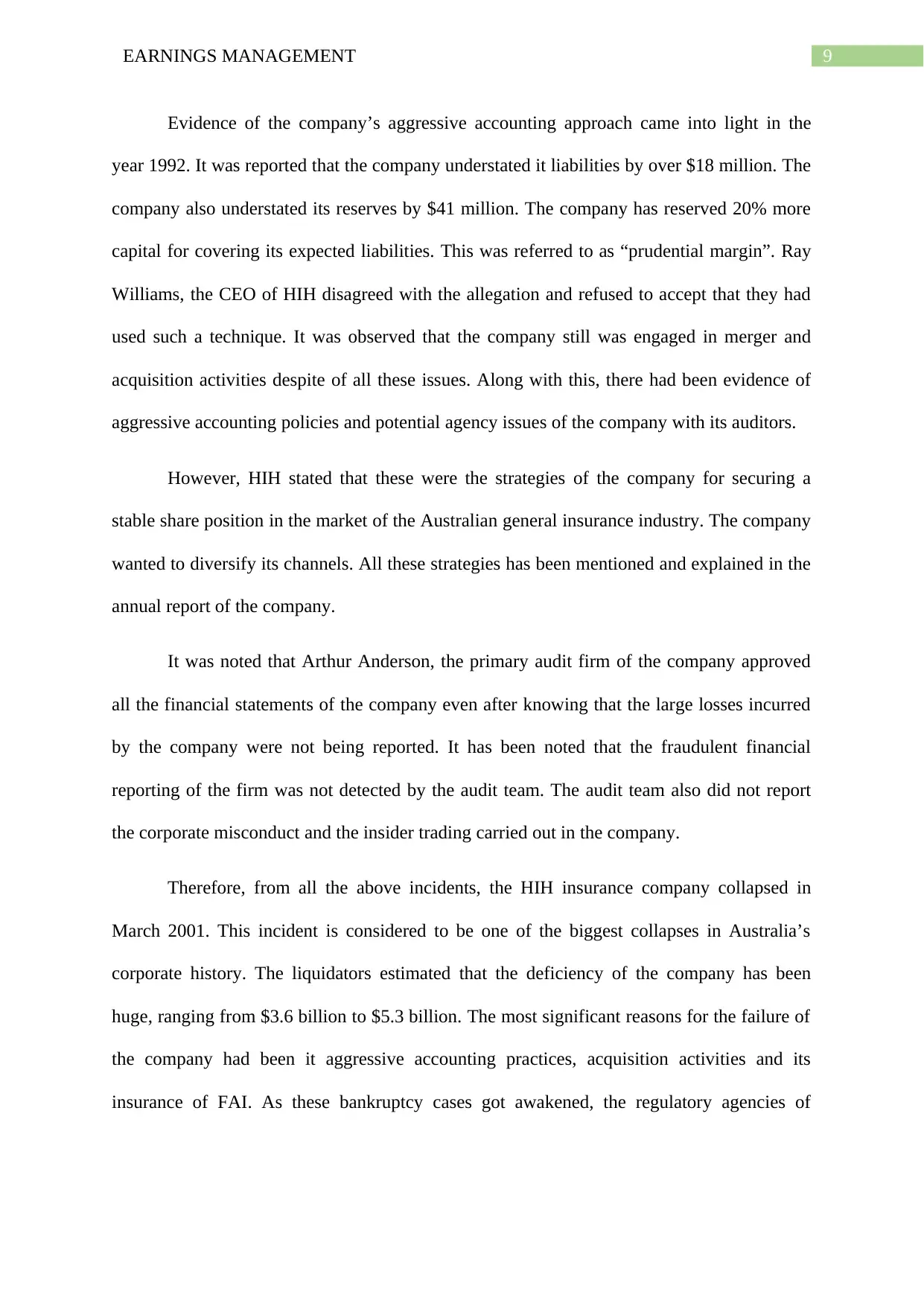
9EARNINGS MANAGEMENT
Evidence of the company’s aggressive accounting approach came into light in the
year 1992. It was reported that the company understated it liabilities by over $18 million. The
company also understated its reserves by $41 million. The company has reserved 20% more
capital for covering its expected liabilities. This was referred to as “prudential margin”. Ray
Williams, the CEO of HIH disagreed with the allegation and refused to accept that they had
used such a technique. It was observed that the company still was engaged in merger and
acquisition activities despite of all these issues. Along with this, there had been evidence of
aggressive accounting policies and potential agency issues of the company with its auditors.
However, HIH stated that these were the strategies of the company for securing a
stable share position in the market of the Australian general insurance industry. The company
wanted to diversify its channels. All these strategies has been mentioned and explained in the
annual report of the company.
It was noted that Arthur Anderson, the primary audit firm of the company approved
all the financial statements of the company even after knowing that the large losses incurred
by the company were not being reported. It has been noted that the fraudulent financial
reporting of the firm was not detected by the audit team. The audit team also did not report
the corporate misconduct and the insider trading carried out in the company.
Therefore, from all the above incidents, the HIH insurance company collapsed in
March 2001. This incident is considered to be one of the biggest collapses in Australia’s
corporate history. The liquidators estimated that the deficiency of the company has been
huge, ranging from $3.6 billion to $5.3 billion. The most significant reasons for the failure of
the company had been it aggressive accounting practices, acquisition activities and its
insurance of FAI. As these bankruptcy cases got awakened, the regulatory agencies of
Evidence of the company’s aggressive accounting approach came into light in the
year 1992. It was reported that the company understated it liabilities by over $18 million. The
company also understated its reserves by $41 million. The company has reserved 20% more
capital for covering its expected liabilities. This was referred to as “prudential margin”. Ray
Williams, the CEO of HIH disagreed with the allegation and refused to accept that they had
used such a technique. It was observed that the company still was engaged in merger and
acquisition activities despite of all these issues. Along with this, there had been evidence of
aggressive accounting policies and potential agency issues of the company with its auditors.
However, HIH stated that these were the strategies of the company for securing a
stable share position in the market of the Australian general insurance industry. The company
wanted to diversify its channels. All these strategies has been mentioned and explained in the
annual report of the company.
It was noted that Arthur Anderson, the primary audit firm of the company approved
all the financial statements of the company even after knowing that the large losses incurred
by the company were not being reported. It has been noted that the fraudulent financial
reporting of the firm was not detected by the audit team. The audit team also did not report
the corporate misconduct and the insider trading carried out in the company.
Therefore, from all the above incidents, the HIH insurance company collapsed in
March 2001. This incident is considered to be one of the biggest collapses in Australia’s
corporate history. The liquidators estimated that the deficiency of the company has been
huge, ranging from $3.6 billion to $5.3 billion. The most significant reasons for the failure of
the company had been it aggressive accounting practices, acquisition activities and its
insurance of FAI. As these bankruptcy cases got awakened, the regulatory agencies of
Paraphrase This Document
Need a fresh take? Get an instant paraphrase of this document with our AI Paraphraser
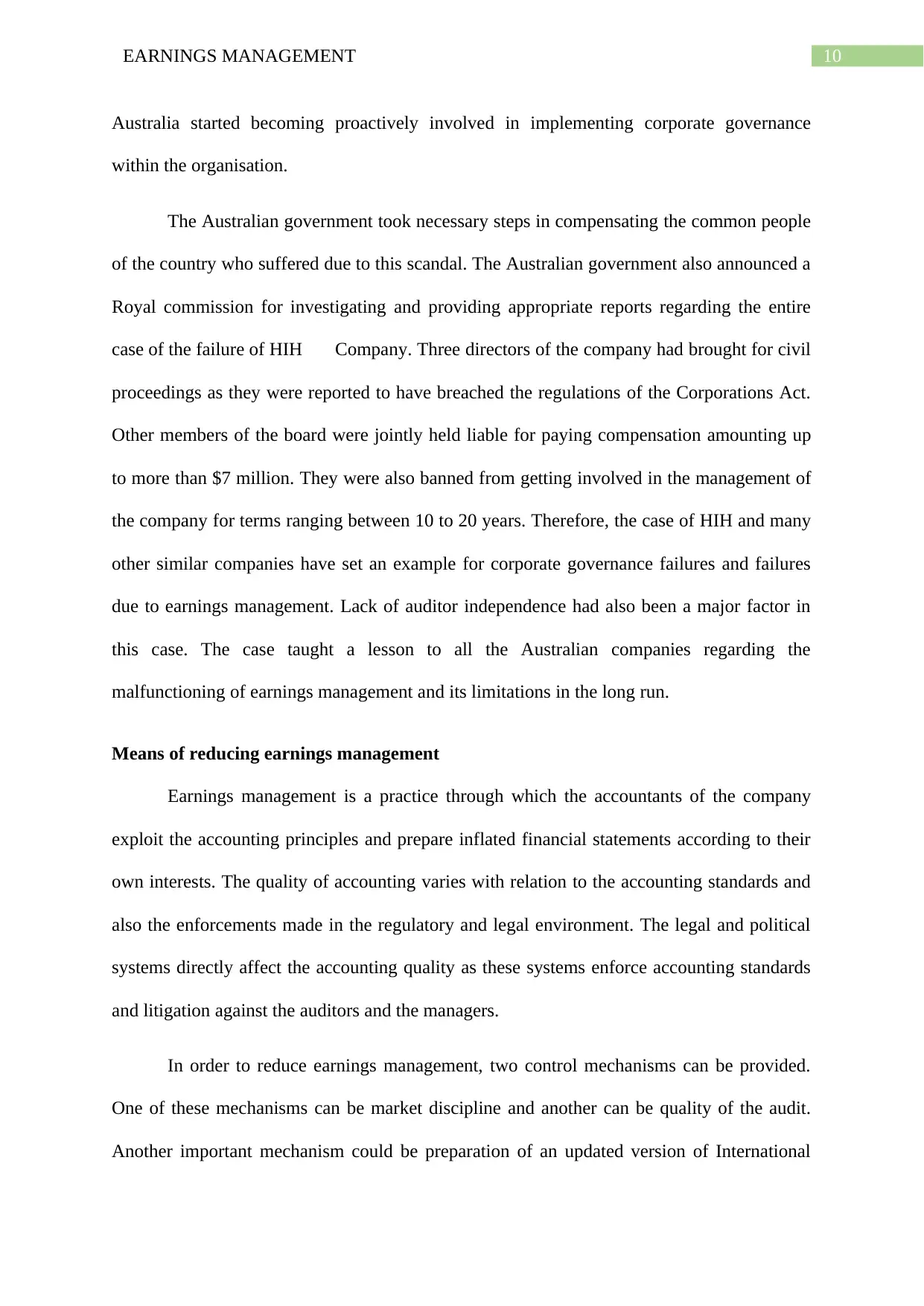
10EARNINGS MANAGEMENT
Australia started becoming proactively involved in implementing corporate governance
within the organisation.
The Australian government took necessary steps in compensating the common people
of the country who suffered due to this scandal. The Australian government also announced a
Royal commission for investigating and providing appropriate reports regarding the entire
case of the failure of HIH Company. Three directors of the company had brought for civil
proceedings as they were reported to have breached the regulations of the Corporations Act.
Other members of the board were jointly held liable for paying compensation amounting up
to more than $7 million. They were also banned from getting involved in the management of
the company for terms ranging between 10 to 20 years. Therefore, the case of HIH and many
other similar companies have set an example for corporate governance failures and failures
due to earnings management. Lack of auditor independence had also been a major factor in
this case. The case taught a lesson to all the Australian companies regarding the
malfunctioning of earnings management and its limitations in the long run.
Means of reducing earnings management
Earnings management is a practice through which the accountants of the company
exploit the accounting principles and prepare inflated financial statements according to their
own interests. The quality of accounting varies with relation to the accounting standards and
also the enforcements made in the regulatory and legal environment. The legal and political
systems directly affect the accounting quality as these systems enforce accounting standards
and litigation against the auditors and the managers.
In order to reduce earnings management, two control mechanisms can be provided.
One of these mechanisms can be market discipline and another can be quality of the audit.
Another important mechanism could be preparation of an updated version of International
Australia started becoming proactively involved in implementing corporate governance
within the organisation.
The Australian government took necessary steps in compensating the common people
of the country who suffered due to this scandal. The Australian government also announced a
Royal commission for investigating and providing appropriate reports regarding the entire
case of the failure of HIH Company. Three directors of the company had brought for civil
proceedings as they were reported to have breached the regulations of the Corporations Act.
Other members of the board were jointly held liable for paying compensation amounting up
to more than $7 million. They were also banned from getting involved in the management of
the company for terms ranging between 10 to 20 years. Therefore, the case of HIH and many
other similar companies have set an example for corporate governance failures and failures
due to earnings management. Lack of auditor independence had also been a major factor in
this case. The case taught a lesson to all the Australian companies regarding the
malfunctioning of earnings management and its limitations in the long run.
Means of reducing earnings management
Earnings management is a practice through which the accountants of the company
exploit the accounting principles and prepare inflated financial statements according to their
own interests. The quality of accounting varies with relation to the accounting standards and
also the enforcements made in the regulatory and legal environment. The legal and political
systems directly affect the accounting quality as these systems enforce accounting standards
and litigation against the auditors and the managers.
In order to reduce earnings management, two control mechanisms can be provided.
One of these mechanisms can be market discipline and another can be quality of the audit.
Another important mechanism could be preparation of an updated version of International
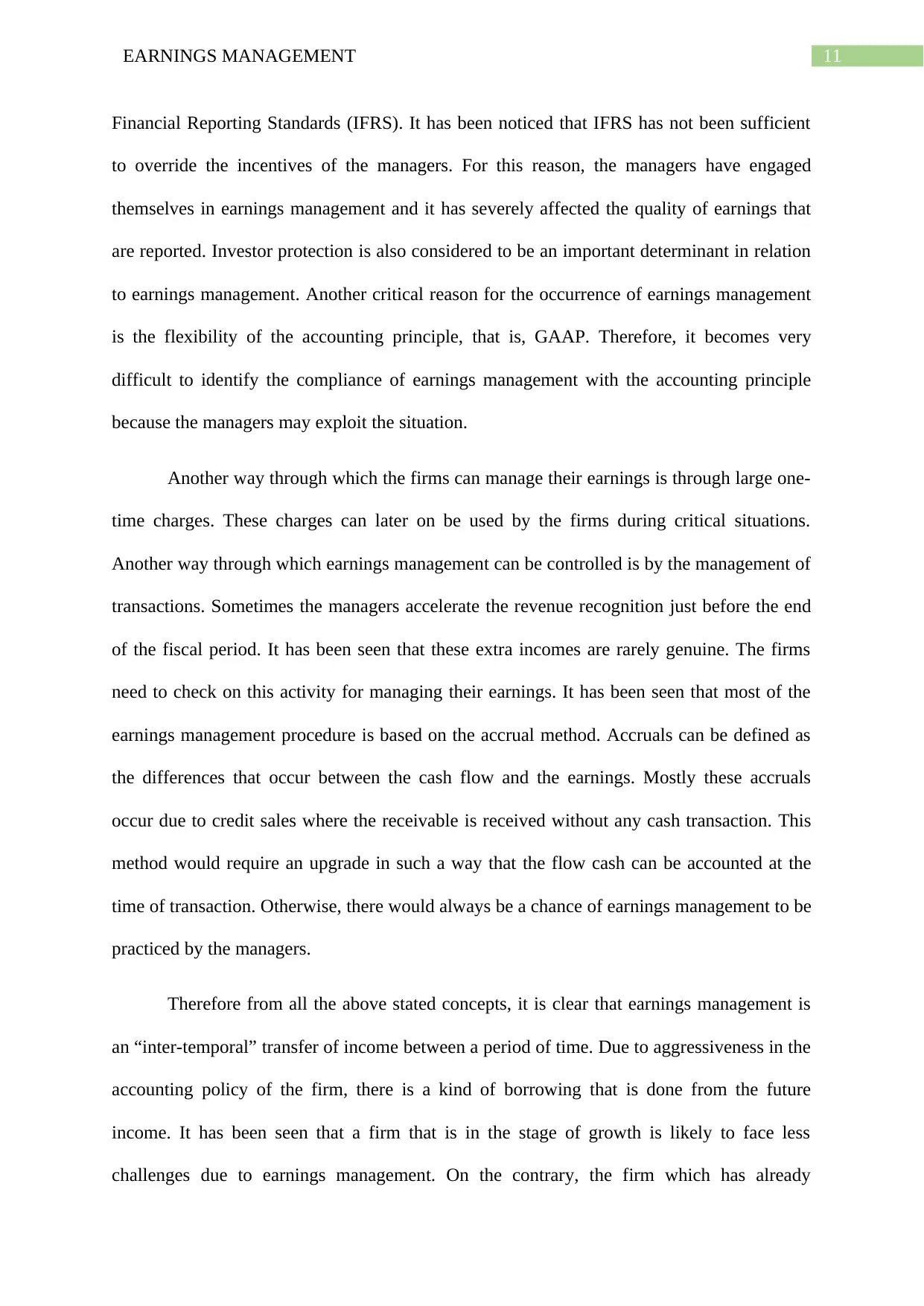
11EARNINGS MANAGEMENT
Financial Reporting Standards (IFRS). It has been noticed that IFRS has not been sufficient
to override the incentives of the managers. For this reason, the managers have engaged
themselves in earnings management and it has severely affected the quality of earnings that
are reported. Investor protection is also considered to be an important determinant in relation
to earnings management. Another critical reason for the occurrence of earnings management
is the flexibility of the accounting principle, that is, GAAP. Therefore, it becomes very
difficult to identify the compliance of earnings management with the accounting principle
because the managers may exploit the situation.
Another way through which the firms can manage their earnings is through large one-
time charges. These charges can later on be used by the firms during critical situations.
Another way through which earnings management can be controlled is by the management of
transactions. Sometimes the managers accelerate the revenue recognition just before the end
of the fiscal period. It has been seen that these extra incomes are rarely genuine. The firms
need to check on this activity for managing their earnings. It has been seen that most of the
earnings management procedure is based on the accrual method. Accruals can be defined as
the differences that occur between the cash flow and the earnings. Mostly these accruals
occur due to credit sales where the receivable is received without any cash transaction. This
method would require an upgrade in such a way that the flow cash can be accounted at the
time of transaction. Otherwise, there would always be a chance of earnings management to be
practiced by the managers.
Therefore from all the above stated concepts, it is clear that earnings management is
an “inter-temporal” transfer of income between a period of time. Due to aggressiveness in the
accounting policy of the firm, there is a kind of borrowing that is done from the future
income. It has been seen that a firm that is in the stage of growth is likely to face less
challenges due to earnings management. On the contrary, the firm which has already
Financial Reporting Standards (IFRS). It has been noticed that IFRS has not been sufficient
to override the incentives of the managers. For this reason, the managers have engaged
themselves in earnings management and it has severely affected the quality of earnings that
are reported. Investor protection is also considered to be an important determinant in relation
to earnings management. Another critical reason for the occurrence of earnings management
is the flexibility of the accounting principle, that is, GAAP. Therefore, it becomes very
difficult to identify the compliance of earnings management with the accounting principle
because the managers may exploit the situation.
Another way through which the firms can manage their earnings is through large one-
time charges. These charges can later on be used by the firms during critical situations.
Another way through which earnings management can be controlled is by the management of
transactions. Sometimes the managers accelerate the revenue recognition just before the end
of the fiscal period. It has been seen that these extra incomes are rarely genuine. The firms
need to check on this activity for managing their earnings. It has been seen that most of the
earnings management procedure is based on the accrual method. Accruals can be defined as
the differences that occur between the cash flow and the earnings. Mostly these accruals
occur due to credit sales where the receivable is received without any cash transaction. This
method would require an upgrade in such a way that the flow cash can be accounted at the
time of transaction. Otherwise, there would always be a chance of earnings management to be
practiced by the managers.
Therefore from all the above stated concepts, it is clear that earnings management is
an “inter-temporal” transfer of income between a period of time. Due to aggressiveness in the
accounting policy of the firm, there is a kind of borrowing that is done from the future
income. It has been seen that a firm that is in the stage of growth is likely to face less
challenges due to earnings management. On the contrary, the firm which has already
⊘ This is a preview!⊘
Do you want full access?
Subscribe today to unlock all pages.

Trusted by 1+ million students worldwide
1 out of 16
Related Documents
Your All-in-One AI-Powered Toolkit for Academic Success.
+13062052269
info@desklib.com
Available 24*7 on WhatsApp / Email
![[object Object]](/_next/static/media/star-bottom.7253800d.svg)
Unlock your academic potential
Copyright © 2020–2026 A2Z Services. All Rights Reserved. Developed and managed by ZUCOL.





